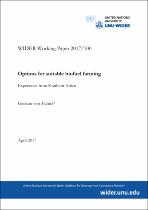JavaScript is disabled for your browser. Some features of this site may not work without it.
- ResearchSpace
- →
- Research Publications/Outputs
- →
- Books
- →
- View Item
| dc.contributor.author |
Von Maltitz, Graham P

|
|
| dc.date.accessioned | 2017-07-28T09:38:49Z | |
| dc.date.available | 2017-07-28T09:38:49Z | |
| dc.date.issued | 2017-04 | |
| dc.identifier.citation | Von Maltitz, G.P. 2017. Options for suitable biofuel farming: Experience from Southern Africa. WIDER Working Paper 2017/100. Helsinki: UNU-WIDER | en_US |
| dc.identifier.isbn | 978-92-9256-324-0 | |
| dc.identifier.issn | 1798-7237 | |
| dc.identifier.uri | https://www.wider.unu.edu/publication/options-suitable-biofuel-farming | |
| dc.identifier.uri | http://hdl.handle.net/10204/9430 | |
| dc.description | Copyright: 2017 UNU-WIDER | en_US |
| dc.description.abstract | Southern African countries’ interest in biofuel is due of its rural development potential. Finding models to optimize this benefit is therefore paramount. High-energy-density crops with low perishability allow farmers to grow small quantities on existing lands. Highly perishable, lowdensity crops such as sugarcane require tight integration between growers and mills. Models where growers have full ownership in the feedstock production facilities are possible, but this normally means that smallholder farmers need to work as a unit to achieve benefits of scale. Finding marketbased mechanisms to ensure sound and equitable returns for land and labour inputs is critical. | en_US |
| dc.language.iso | en | en_US |
| dc.publisher | publications@wider.unu.edu | en_US |
| dc.relation.ispartofseries | Worklist;18967 | |
| dc.subject | Biofuel | en_US |
| dc.subject | Jatropha | en_US |
| dc.subject | Sugarcane | en_US |
| dc.subject | Rural development | en_US |
| dc.subject | Ethanol | en_US |
| dc.subject | Southern Africa | en_US |
| dc.title | Options for suitable biofuel farming: Experience from Southern Africa | en_US |
| dc.type | Book | en_US |
| dc.identifier.apacitation | Von Maltitz, G. P. (2017). <i>Options for suitable biofuel farming: Experience from Southern Africa</i>. publications@wider.unu.edu. http://hdl.handle.net/10204/9430 | en_ZA |
| dc.identifier.chicagocitation | Von Maltitz, Graham P. <i>Options for suitable biofuel farming: Experience from Southern Africa</i>. n.p.: publications@wider.unu.edu. 2017. http://hdl.handle.net/10204/9430. | en_ZA |
| dc.identifier.vancouvercitation | Von Maltitz GP. Options for suitable biofuel farming: Experience from Southern Africa. [place unknown]: publications@wider.unu.edu; 2017.http://hdl.handle.net/10204/9430 | en_ZA |
| dc.identifier.ris | TY - Book AU - Von Maltitz, Graham P AB - Southern African countries’ interest in biofuel is due of its rural development potential. Finding models to optimize this benefit is therefore paramount. High-energy-density crops with low perishability allow farmers to grow small quantities on existing lands. Highly perishable, lowdensity crops such as sugarcane require tight integration between growers and mills. Models where growers have full ownership in the feedstock production facilities are possible, but this normally means that smallholder farmers need to work as a unit to achieve benefits of scale. Finding marketbased mechanisms to ensure sound and equitable returns for land and labour inputs is critical. DA - 2017-04 DB - ResearchSpace DP - CSIR KW - Biofuel KW - Jatropha KW - Sugarcane KW - Rural development KW - Ethanol KW - Southern Africa LK - https://researchspace.csir.co.za PY - 2017 SM - 978-92-9256-324-0 SM - 1798-7237 T1 - Options for suitable biofuel farming: Experience from Southern Africa TI - Options for suitable biofuel farming: Experience from Southern Africa UR - http://hdl.handle.net/10204/9430 ER - | en_ZA |






